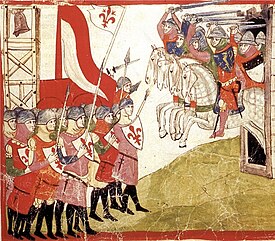Battle of Montaperti
| Battle of Montaperti | |||||||
|---|---|---|---|---|---|---|---|
| Part of Guelphs and Ghibellines | |||||||
 |
|||||||
|
|||||||
| Belligerents | |||||||
|
Ghibellines: Terni Tuscan Ghibellines |
Guelphs: Perugia and Orvieto Tuscan Guelphs |
||||||
| Commanders and leaders | |||||||
| Podestà Troghisio Giordano d'Anglano |
Podestà Rangoni Monaldo Monaldeschi |
||||||
| Strength | |||||||
| 17,000 troops | 33,000 troops | ||||||
| Casualties and losses | |||||||
| 600 killed 400 wounded |
2,500 killed 1,500 captured |
||||||
The Battle of Montaperti was fought on 4 September 1260 between Florence and Siena in Tuscany as part of the conflict between the Guelphs and Ghibellines. The Florentines were routed. It was the bloodiest battle fought in Medieval Italy, with more than 10,000 fatalities. An act of treachery during the battle is recorded by Dante Alighieri in the Inferno section of the Divine Comedy.
The Guelphs and Ghibellines were rival factions that nominally took the parts of the Papacy and the Holy Roman Empire, respectively, in Italy in the 12th and 13th centuries; in practice, their allegiances often had more to do with competing local interests than with the contesting claims of the papacy and the Empire.
In the mid-13th century, Guelphs held sway in Florence whilst Ghibellines controlled Siena. In 1258, the Guelphs succeeded in expelling from Florence the last of the Ghibellines with any real power; they followed this with the murder of Tesauro Beccharia, Abbot of Vallombrosa, who was accused of plotting the return of the Ghibellines.
The feud came to a head two years later when the Florentines, aided by their Tuscan allies (Bologna, Prato, Lucca, Orvieto, San Gimignano, San Miniato, Volterra and Colle Val d'Elsa), moved an army of some 35,000 men (including 12 generals) toward Siena. The Sienese called for help from King Manfred of Sicily, who provided a contingent of German mercenary heavy cavalry, as well as the Holy Roman states of Pisa and Cortona. The Sienese forces were led by Farinata degli Uberti, an exiled Florentine Ghibelline. Even with these reinforcements, though, they could raise an army of only 20,000.
...
Wikipedia
